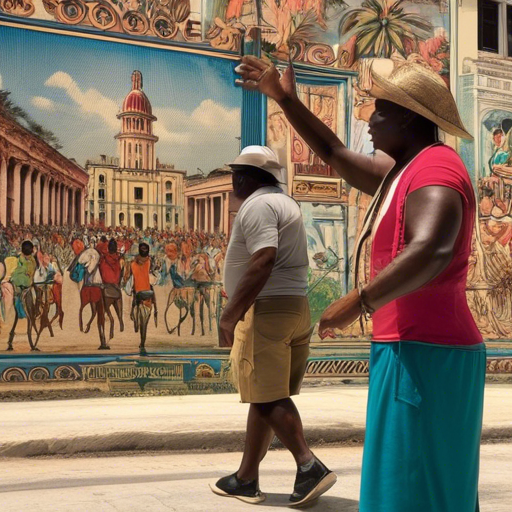the rich tapestry of cuba's history from colonization to revolution

The Rich Tapestry of Cuba's History from Colonization to Revolution
Cuba's history is a complex and fascinating journey that spans centuries, marked by colonization, slavery, independence movements, and revolutionary fervor. This article delves into the significant events and periods that have shaped Cuba into the nation it is today. From the arrival of Christopher Columbus to the rise of Fidel Castro, we explore the rich tapestry of Cuba's past.
Colonial Beginnings: The Arrival of Columbus
In 1492, Christopher Columbus landed on the shores of Cuba, marking the beginning of Spanish colonization. The indigenous Taíno people, who had lived on the island for centuries, were soon subjected to Spanish rule. The colonization period was characterized by the exploitation of native populations and the establishment of a plantation economy.
The Impact of Spanish Rule
Spanish colonization brought significant changes to Cuba's social and economic structures. The introduction of sugarcane plantations led to the importation of African slaves, fundamentally altering the island's demographic composition. By the 18th century, Cuba had become one of the world's leading sugar producers.
- 1492: Columbus arrives in Cuba.
- 1511: Spanish conquest begins.
- 1762: British capture Havana for a brief period.
Table: Key Events in Colonial Cuba
| Year | Event | Emoji |
|---|---|---|
| 1492 | Columbus lands in Cuba | 🚢 |
| 1511 | Spanish conquest begins | ⚔️ |
| 1762 | British capture Havana | 🇬🇧 |
Struggle for Independence
The 19th century was a period of intense struggle for Cuban independence. The island's inhabitants grew increasingly discontented with Spanish rule, leading to a series of uprisings and wars. The Ten Years' War (1868-1878) was the first major attempt to gain independence, though it ultimately ended in a stalemate.
The Role of José Martí
José Martí, a national hero, played a pivotal role in the fight for Cuban independence. His writings and leadership inspired many to join the cause. Martí's vision of a free and democratic Cuba galvanized the nation and laid the groundwork for future revolutionary movements.
- 1868-1878: Ten Years' War.
- 1895: José Martí launches the War of Independence.
- 1898: Spanish-American War leads to Cuban independence.
Table: Key Figures in Cuban Independence
| Name | Role | Emoji |
|---|---|---|
| José Martí | Leader and national hero | 🦸 |
| Antonio Maceo | Military leader | ⚔️ |
| Máximo Gómez | Military strategist | 🧠 |
The Cuban Revolution
The mid-20th century saw the rise of revolutionary movements that would forever change Cuba's political landscape. The most significant of these was the Cuban Revolution, led by Fidel Castro and his band of guerrilla fighters. The revolution culminated in the overthrow of the Batista regime in 1959.
Fidel Castro's Rise to Power
Fidel Castro emerged as a charismatic and determined leader, rallying support from various segments of Cuban society. His revolutionary ideology was rooted in anti-imperialism and socialism, aiming to address the deep-seated inequalities that plagued the nation. Castro's successful guerrilla campaign against Batista's forces was a turning point in Cuban history.
- 1953: Castro's failed attack on Moncada Barracks.
- 1956: Castro and his followers land in Cuba on the Granma yacht.
- 1959: Batista flees, and Castro takes power.
Table: Key Events in the Cuban Revolution
| Year | Event | Emoji |
|---|---|---|
| 1953 | Attack on Moncada Barracks | 🔫 |
| 1956 | Landing of the Granma | 🛥️ |
| 1959 | Castro takes power | 🏛️ |
Post-Revolutionary Cuba
Following the revolution, Cuba underwent significant social and economic transformations. The new government implemented sweeping reforms, including the nationalization of industries and the establishment of a centrally planned economy. These changes aimed to eradicate poverty and reduce social inequalities.
Economic and Social Reforms
The Cuban government focused on improving healthcare, education, and housing for its citizens. These efforts led to notable achievements, such as a high literacy rate and a robust healthcare system. However, the economic embargo imposed by the United States posed significant challenges to Cuba's development.
- 1961: Bay of Pigs Invasion.
- 1962: Cuban Missile Crisis.
- 1991: Collapse of the Soviet Union impacts Cuba's economy.
Table: Key Events in Post-Revolutionary Cuba
| Year | Event | Emoji |
|---|---|---|
| 1961 | Bay of Pigs Invasion | 🏝️ |
| 1962 | Cuban Missile Crisis | 🚀 |
| 1991 | Collapse of the Soviet Union | 🛑 |
Conclusion
Cuba's history is a testament to the resilience and determination of its people. From the early days of colonization to the revolutionary fervor that reshaped the nation, Cuba's past is rich with stories of struggle and triumph. As we reflect on this history, we gain a deeper understanding of the forces that have shaped Cuba into the unique and vibrant country it is today.
For those interested in exploring more about Cuba's history and culture, consider visiting this travel guide for comprehensive insights and travel tips.
FAQ
What were the main causes of the Cuban Revolution?
The Cuban Revolution was primarily driven by widespread discontent with the Batista regime, economic inequalities, and the desire for social justice. Fidel Castro's leadership and revolutionary ideology also played a crucial role in mobilizing support for the movement.
How did Spanish colonization impact Cuba?
Spanish colonization had a profound impact on Cuba, leading to the exploitation of indigenous populations, the establishment of a plantation economy, and the importation of African slaves. These changes significantly altered Cuba's social and economic structures.
What were the key achievements of post-revolutionary Cuba?
Post-revolutionary Cuba made significant strides in healthcare, education, and housing. The government implemented reforms aimed at reducing social inequalities and improving the quality of life for its citizens. Notable achievements include a high literacy rate and a robust healthcare system.
How did the collapse of the Soviet Union affect Cuba?
The collapse of the Soviet Union in 1991 had a severe impact on Cuba's economy, as the island nation lost its primary source of economic support. This led to a period of economic hardship known as the "Special Period," during which Cuba faced significant challenges in maintaining its social and economic systems.
```